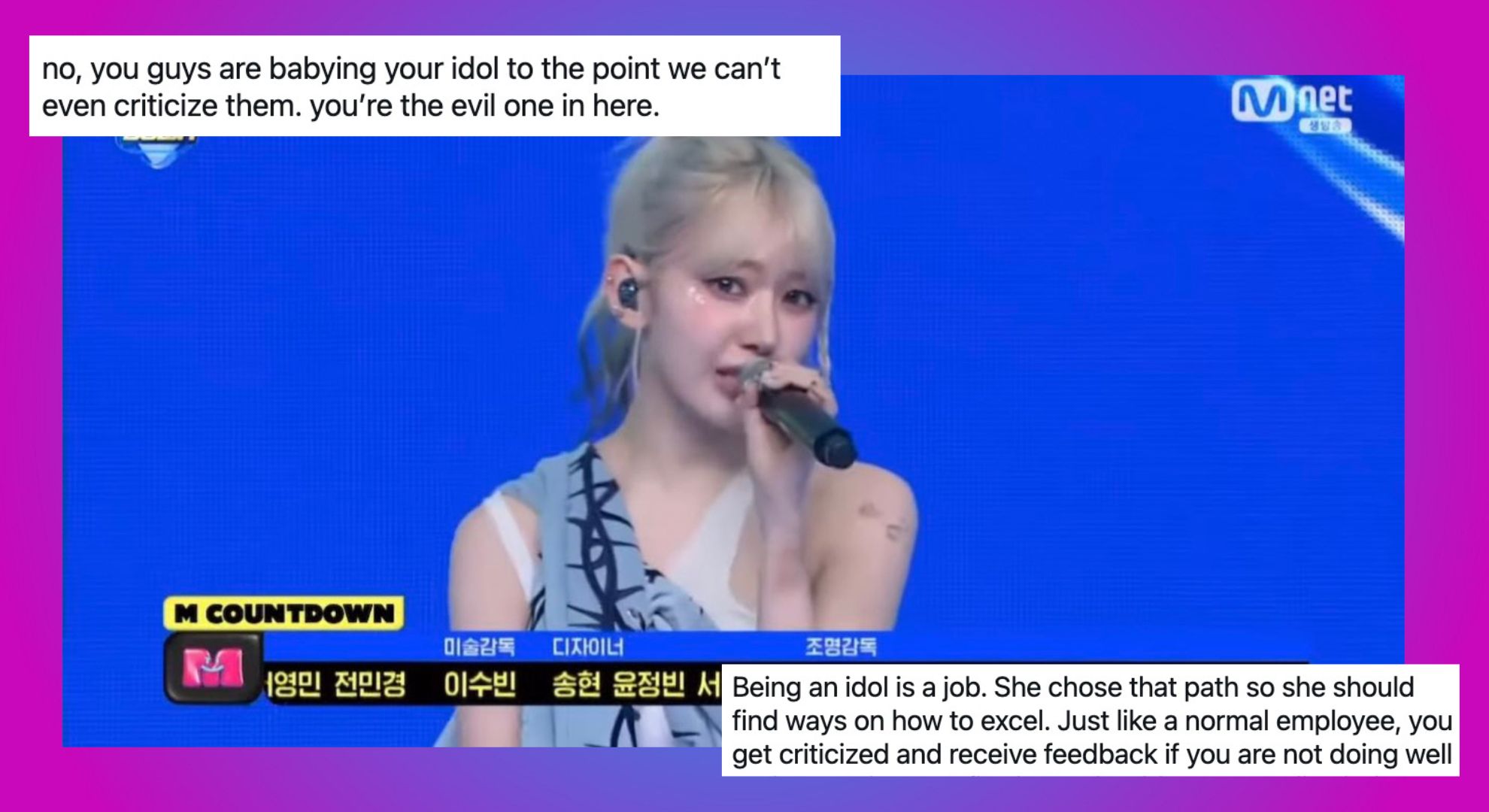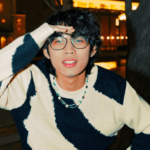Celebrities and idols really do have it rough every single day—handling criticisms, being held to some of the most unrealistic standards set by society and the industry, and facing unsubstantiated rumors on a daily basis. Imagine just living your best life, performing your latest songs or whatnot, then come nighttime and you’re dead scrolling on social media, you suddenly see a whole lot of people calling you different names, derogatory adjectives, and the like.
And for what, just being a human that makes mistakes? It’s surprising how these idols still have the stomach to perform despite all the negativity they receive on a daily basis, and how others still want to be one.
However, at the same time, idols are indeed meant to uphold a standard in the industry. Globally, K-Pop idols are known for having a grueling system of training prior to debuting, where they are given dance, vocal, variety, language, and more lessons to prepare for idol life.
This brings us to the question, when it comes to asking idols to improve a bit more on their skills expected of them, does it immediately count as bullying or hate?
Just recently, LE SSERAFIM (especially members Sakura and Eunchae) faced an immense backlash on the Internet following their encore stage on a music show, where some of the members were singing off-key and looking nervous while doing so. Considering that this was a group that gained popularity and traction due to their performance and music, a lot of K-Pop fans were shocked to hear their dismaying encore performance—without the choreography.
This began a discussion on the state of the K-Pop industry at the moment—where nowadays people become idols mainly because of their visuals over training and honing their singing and dancing, when they are supposed to be great singers AND dancers.
They were also saying that telling idols to improve and train harder does not equate to bullying almost immediately, because it’s (quite literally) their job to do so.
Sakura literally looked like she was about to cry on that encore stage. The bullying that woman has received is so fucking evil. It’s truly heartbreaking to see her scared on stage because she knows people will over criticize her. Kpop fans are absolutely disgusting. pic.twitter.com/qiBOxt5n14
— Danny👻 (@LeSserafimTokki) February 29, 2024
HYBE PLEASE DO A PROPER VOCAL TRAINING FOR HER. SHE'S PRETTY, FUNNY, HER DANCING SKILL IMPROVES SO MUCH BUT PLEASE JUST ONE THING
— pian (@tiwan) March 1, 2024
You guys are not surviving the Coachella crowd because they are ten times worst than K-POP stans. https://t.co/IGMpNBz5GQ pic.twitter.com/BM3aUpfCpH
— ً (@sooyarbie) March 1, 2024
https://twitter.com/w00kbun/status/1763484657905963122?s=20
Being an idol is a job. She chose that path so she should find ways on how to excel. Just like a normal employee, you get criticized and receive feedback if you are not doing well and worst they get fired. We should not normalize being okay with small improvements. https://t.co/4DD3J39uJD
— 킨kynn – BAE173 IS BACK (@kjleexxvii) March 1, 2024
idk it’s almost like being a singer for over a decade and still being unable to hold a note standing still warrants some of that criticism lmao 🤷🏼♀️ https://t.co/lMQ1B8cJfN
— billie 🦋 arlecchino haver (@dlwlrmago) March 1, 2024
I mean she's introduced as an artist, if her job is to sing and she can't sing, what is she standing on the stage for holding a mic…? https://t.co/Qf5ZhaQmVn pic.twitter.com/FFgf1DO6K9
— Karma is a JIYONGIST🫀 (@annepmo) March 1, 2024
or hear me out, maybe just get better so you won't get criticized? https://t.co/vofJpUWZpj pic.twitter.com/JWEspKQkfm
— zay 🫧 (@beboopsz) March 1, 2024
So we can’t give criticisms now to idols who are lacking singing skills or else we’d be called bullies?? K-Pop is too messy lol https://t.co/kVOF0VpM63
— 𓆩♡𓆪 EU 🐱 (@euniceindaeyooo) March 1, 2024
no, you guys are babying your idol to the point we can’t even criticize them. you’re the evil one in here.
weak ass stans. https://t.co/OKYJgSITjq
— tea🍉 (@JAZZSAIKIDELIC) March 2, 2024
you are incredibly down bad for kpop if you think simply calling a bad singer a bad singer is bullying. she had 10 years to get t it together and she still afraid of a mic it is getting goofy now https://t.co/gTgugALQoS pic.twitter.com/w2LLh6M7kf
— 𝐿 ⋆ (@mainbtchlisa) March 1, 2024
bullying is shitty and i hate to break it to you honey, but singers are supposed to know how to sing https://t.co/LsLIBLL85P pic.twitter.com/8Tzufz8TWO
— suster ngesot (@reennieya) March 2, 2024
At the same time, FEARNOTS were quick to come to LE SSERAFIM’s defense, saying that the criticisms that the girl group was receiving was too vile. Others mentioned how people were so quick to nitpick a group’s mistakes so quickly and selectively.
Sakura literally looked like she was about to cry on that encore stage. The bullying that woman has received is so fucking evil. It’s truly heartbreaking to see her scared on stage because she knows people will over criticize her. Kpop fans are absolutely disgusting. pic.twitter.com/qiBOxt5n14
— Danny👻 (@LeSserafimTokki) February 29, 2024
Im genuinely so fucking pissed. NOBODY deserves that, especially someone as sweet and caring as Sakura.
— Danny👻 (@LeSserafimTokki) February 29, 2024
kpop has destroyed her singing confidence like hell. she used to perform many songs including solo songs during her jpop era and ever since kpop she is SCARED to sing because of the massive bullying from kpop fans.and she was actually starting to feel comfortable w singing /cont https://t.co/pp6x0uYwv0
— mia 𐙚 (@3KiMKKURA) March 1, 2024
mind you encore stages are supposed to be fun. there’s no standard, it’s given to them as a silly thing after winning an award. you people will rot for genuinely fucking up artists confidence because YOU didnt like the silly fucking encore stage. DO FUCKING BETTER. https://t.co/lxvY1spUmh
— Fin 🇵🇸 HAERIN DAY 🐸 (@finmixx) February 29, 2024
idols fear encore stages because kpop stans have set the precedent that unless you're perfect 100% of the time then you're untalented and undeserving of your success.
and yall will bully these people relentlessly until it eventually does affect them to an irreversible extent. https://t.co/plh8rNY460
— k⁹⁺⁷ | #HOTS | CHAEPRIL 🐯 (@JihyosMissRight) March 1, 2024
Sakura just deserves the best she's one of the idols who improves every time she was born to be on stage but these fucking kpop stans want us to believe otherwise fuck you all https://t.co/3hnCfmVyAJ
— Yunjin_fav_loser🇵🇸🇨🇩 (@Yunjinfemme) February 29, 2024
Yall don’t understand how much it pains me to see sakura like this… she has to cover up her emotions with a smile like everything is ok, when we all know shes not, like this is honestly my breaking point… https://t.co/7HnUQgdUbZ
— rae˙ (@chaecvntc) February 29, 2024
She can sing, she's just not as good as others and it's okay. Not everyone has the capacity to sing perfectly,, can you guys stop bullying a human, she's an amazing dancer and aperformer. Let's not straight up hate on humans in the name of criticizing please! https://t.co/SCvtmDZuTS
— shortcake🍓 (@stardustnswer) March 1, 2024
this Le sserafim encore is a prime example of how kpop stans dont understand the difference between "critique" & "bashing a group"pic.twitter.com/TnGgxeHwnC
— #1 schoolin life stan (@Kpopstan5670) March 1, 2024
just a reminder that lesserafim was receiving hate for the smallest things before that whole encore thing happened.
— stinky (@HEEJlNIST) March 3, 2024
In relation to the discourse, a popular TikToker (@/bertubble) sort of fueled the fire by saying that it doesn’t matter if a K-Pop idol has “mediocre” vocals and that it is enough for him that they sell the “fantasy” of being a K-Pop idol. He had even pointed out Dara from 2NE1 as an example, which triggered a lot of people.
https://twitter.com/biasauurus/status/1764131162782388426?s=20
Not a lot of people agreed with his hot take, immediately questioning whether or not people still tune in to K-Pop for the music. Some also pointed out that an idol should at least know how to sing, as it is their job.
do these people not even listen to the music 😭
— alex (@ex0defender) March 3, 2024
so he just casually said that in his opinion, idols are not real singer. he doesn't care if an idol can sing or not 🙃
— nini 🦋 – opress apps prem (@rubsjanez) March 3, 2024
this is why the term idol is damaging. they don't need to be good at singing as long as they look nice and can pose really well. right? pic.twitter.com/du91EaM52I
— hotelareumdabji (hotelA) (@quotedearjangmi) March 4, 2024
this mentality is why kpop is still treated like a joke 😭 not even the fans respect them as artists
— 🌊Kore🌙 (@Night_Kore) March 3, 2024
“When your title is ‘Singer’ you should sing.” pic.twitter.com/PBP0HkEyW1
— Cole (@ColeBLINK) March 3, 2024
So I can be a chef and my cook is sh¡t as long as I can hold a knife and a spoon and look like one💀
— 𝚇 𝙴𝚇𝙾 ʟ (@exo_xoplanet) March 3, 2024
Why this motherfucker is comparing Dara with Sakura, when this is literally Dara back in her group days : pic.twitter.com/OZzIbk2xE7 https://t.co/zTueOaMs8l
— TY21 Ent (@TY21Ent) March 4, 2024
As much of an a$$h0le Yesung's company is at handling their artists, their idol training system is no joke. IDOLS are SINGERS. They should be able to sing first. This take that "idols only sell fantasy" is so disrespectful and an insult to idols who actually value their craft. https://t.co/QakClOnNt2 pic.twitter.com/gmF84gNasi
— MayLoOvaltineEnergen (@MayLoWrites) March 4, 2024
Idols main job is to SING no one is expecting them to be Mariah Carey or Frank Sinatra but at least they have to have decent vocals
pic.twitter.com/6rzGAXG76l https://t.co/MJMwjmiAkn— mimi 🌱 (@JesBlue_) March 3, 2024
K-Pop as a genre is truly doomed if people think idols are "selling a fantasy" instead of wanting to be taken seriously as artists and within the music industry. pic.twitter.com/NEW8R6CgSz https://t.co/dxs7XN0Few
— Λ L E X (@alexanderbihn) March 3, 2024
yeah so this is what happens when idols who can't sing are leading and representing kpop, i just feel bad for the real singers in the industry bc wdym you'd go to western artists instead if you wanted vocals https://t.co/86iYHL1J2N
— lach #GOLDENHOUR (@geonbaeee) March 3, 2024
imagine training for 3+ years and then debuting and seeing people say that your job isn’t that serious and if they wanted to watch people with talent they’d go somewhere else like woah?? 😭 https://t.co/3wT55K5gyp
— sha 🍚 (@pvssycatb) March 3, 2024
https://twitter.com/bbhdotin/status/1764271804196258180?s=20
Hold on, I just watched the first part of the video. Why is he comparing Dara to Sakura? Dara isn't afraid to sing and she can actually hold a note.pic.twitter.com/TW8BGxGgHq https://t.co/vmKxdWZaNL
— ♦♠♥♣LunarSkye♣♥♠♦ (@LunarSkye) March 3, 2024
Well that explains why some stans have nothing positive or meaningful to say about their favs other than numbers and charts lol https://t.co/6dgNzF6pOr
— ɢᴏʟᴅᴇɴ ᴍᴏᴜɴᴛɪɴʏ ✨️ (@mountiny_1024) March 3, 2024
In this context, where should we draw the line between rightfully criticizing idols and bullying? Were K-Pop fans right in saying that LE SSERAFIM needs to head back into the practice room to improve on their vocals, or were those comments already borderline bullying?
Are the fans of K-Pop idols too sensitive and immediately come to the defense of their favorites at just the first sign of criticism (regardless if they were constructive or not), or are they right for doing so?
It’s quite difficult to distinguish to say the least, but at the same time, it isn’t. Safe to say, most K-Pop stans could be called as snowflakes at this point; and they’re not the ones at the receiving end of the criticisms they’re seeing.
At the same time, just holding your favorite K-pop idols to standards that are below them in an attempt to shield them from criticism doesn’t make them better. It, in fact, just boxes them into remaining at the level that they currently are and doesn’t give them the motivation to improve.
And that one idol already had years of experience, so what is stopping her from continuously wanting to improve her skills?
Sure, idols and celebrities do have it tough with all the criticism they get. But, some of those criticisms may even be warranted because of how they’re performing.
K-Pop as an entire genre is known for its intertwining of concept, vocal, choreography, visuals, and music production. It’s what sets this genre apart from all the others, including the West. If we can’t hold these idols accountable to the standard they should be upholding, then do we really support their careers?
Other POP! stories that you might like:
Chung Ha to make her highly anticipated comeback after 2 years
Did Lee Jae-wook, aespa’s Karina dating news directly affect SM Entertainment shares?
Zico apologizes for popularizing ‘Dance Challenge’ trend in K-pop, stans thank him instead
IFPI declares ‘FML’ by SEVENTEEN as 2023’s biggest-selling album worldwide
Filipinos call out NAIA on social media after finding bed bugs at Terminal 2 and 3



